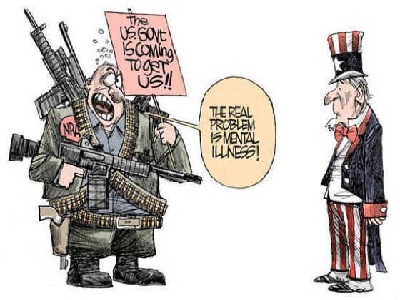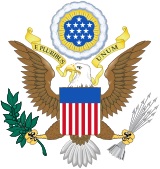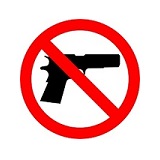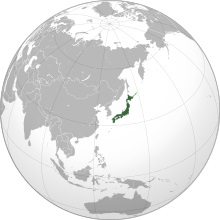 Ban
Guns Ban
Guns
I
spent many days trying to figure where to begin this topic.
I am one of the possibly few Americans who do not own a gun
and in fact, have never even fired, or held one for that
matter. I am not an expert in guns and barely knew the
difference between "ouzo", a distilled beverage, and an "uzi",
a submachine gun. The one thing I do know is what the use of
a gun can do to people and to a family.
Many years ago, while at his place of business in Buffalo,
New York, a thief shot my uncle in the head and killed him.
Although I was very young at the time, I can vividly
remember the affect his death had on my immediate family and
relatives. Things were never the same in my family after
that. Growing up, I often wondered why people were allowed
to own guns in the first place when their only purpose is to
INJURE or KILL. The Second Amendment of the United States
Constitution, or shall I say the misinterpretation of it, is
totally to blame for the unchecked rise in the possession of
guns in America. |
|
|
 2nd
Amendment 2nd
Amendment
The majority of Americans continue to uphold and embrace The
Second Amendment of the United States Constitution (an
outdated set of laws) which reads: "A well regulated
Militia, being necessary to the security of a free State,
the right of the people to keep and bear Arms, shall not be
infringed". The intent of the Second Amendment was for
Americans to be armed against a possible overthrow of the
newly established government, not to be armed with
semi-automatic assault weapons, which are being used time
and time again to murder and massacre thousands of innocent
American citizens across the country every year.
Justice Ruth Bader Ginsburg expressed this sentiment very
eloquently while speaking in an interview on public radio
station WNYC, when she called the Second Amendment
"outdated," saying:
When we no longer need people to keep muskets in their home,
then the Second Amendment has no function ... If the Court
had properly interpreted the Second Amendment, the Court
would have said that amendment was very important when the
nation was new; it gave a qualified right to keep and bear
arms, but it was for one purpose only—and that was the
purpose of having militiamen who were able to fight to
preserve the nation.
The right to keep and bear arms (often referred to as the
right to bear arms) is the people's right to possess
armaments (arms) for their own defense, as described in the
philosophical and political writings of Aristotle, Cicero,
John Locke, Machiavelli, the English Whigs and others.
Inclusion of this right in a written constitution is
uncommon. In 1875, 17 percent of constitutions included a
right to bear arms, yet, since the early twentieth century,
"the proportion has been less than 10 percent and falling".
In their historical survey and comparative analysis of
constitutions dating back to 1789, Tom Ginsburg and
colleagues "identified only 15 constitutions (in nine
countries) that had ever included an explicit right to bear
arms. Almost all of these constitutions have been in Latin
America, and most were from the 19th century".
Generally, where modern constitutions refer to arms at all,
the purpose is "to allow the government to regulate their
use or to compel military service, not to provide a right to
bear them". Constitutions which historically guaranteed a
right to bear arms are those of Bolivia, Colombia, Costa
Rica, Guatemala, Honduras, Liberia, Mexico, Nicaragua and
the United States of America. Nearly all of Latin American
examples were modeled on that of the United States.
At present, out of the world’s nearly
200 constitutions, three still include a right to bear arms:
Guatemala, Mexico, and the United States; of these three,
only the United States
does not include explicit restrictive conditions. |
|
 Guns
should be illegal Guns
should be illegal
The possession of guns should be illegal in the United
States. GUNS ARE FOR INJURING AND KILLING, NOTHING MORE, and
should not even exist in a civilized society, simply look at
the numbers. The United States population owns an estimated
total of 300 million guns, averaging approximately 112.6
guns per 100 residents putting the U.S. in worldwide
undisputed first place, with its' closest rival being Serbia
with 75.6 guns per 100 residents. Even scarier is America
has an average death rate of approximately 10 people per
100,000 population per year which puts the U.S. in close
competition with South and Central American countries like
Panama. The 2016 shooting in Orlando, Florida which killed
50 and injured 53 and the San Bernardino, California
shooting of 2015 which killed 14 and injured 21 more could
have easily been prevented if guns were not so easily
available. |
|
|
 Case
Studies Case
Studies
Simply look at a few countries who changed their gun laws
and you will see the kind of America which could exist if
gun laws were changed, or better yet, if guns were made to
be illegal altogether. Will killings and suicides continue
without guns?....of course, but the massacres occurring in
our public places, such as shopping malls, restaurants, and
even schools, would go away. |
Case Study #1 - Japan
The possession of a gun by a private citizen is illegal. I
have lived in Japan for a long time and cannot tell you
what it feels like to go anywhere in this country without
the fear of being shot, even in the inner city areas. In
addition, Japan is a cash society with few people using
credit cards for purchase yet there is still an extremely
low crime rate. This is partly due to Japanese culture,
another subject entirely, but much can be attributed to the
lack of guns in this peaceful society. |
|
|
Case Study #2 - Australia
Between 1979 and 1996 Australia had 13 mass shootings
including the Port Arthur massacre in Tasmania where 35
people were killed by semi-automatic weapons. The federal
government implemented new gun control legislation which
banned most weapons and instituted a mandatory gun buy back
program. No mass shootings occurred for 19 years after the
laws were changed. |
|
|
Conclusion
Americans will eventually need to get rid of the "gun
culture" and abolish ALL guns in circulation if they ever
want to live in a safe and civilized society. |
|
|
|
|